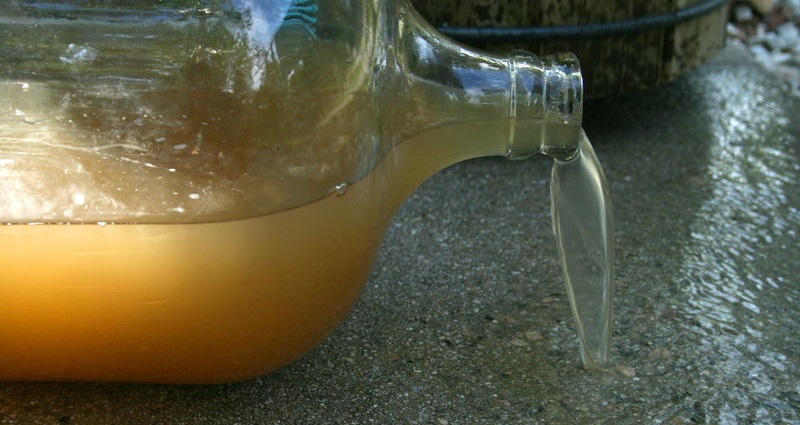Murky: A Poem

At the Yale Graduate Conference in Religion and Ecology, the following poem was read by Jennifer Maidrand, a student at Drew University’s Theological School:
The waters are murky.
Trash bags hanging above the riverbed in the trees,
swinging in the Southern breeze,
and for black bodies there is still no relief,
from the assault of fire arms,
and pollution,
and the institutions
that keep injustice locked in place,
for those of an antagonized race.
No clean water for Appalachia.
No clean water for Flint.
And Nestle is a stone’s throw away,
but do not worry yourself into disarray—
spring water is on sale at Walmart,
and the reason needs no hint—
their message, like the water,
is crystal clear:
“Clean water can be purchased by all—far and near!”
—
That, is true,
unless a CEO’s definition of We the People
was written with an amnesic history,
towards those whose Blessings of Liberty,
rely upon an im-perfect Union,
and a not-so-general Welfare.
The waters are murky.
Forget any conversation on liberties and ownership,
in a Holy Land whose treatment of the Other
goes far beyond censorship,
where cement blockades partition people from land,
and an apartheid regime extracts water from their hand,
only to gift it back at a reasonable cost,
and not to worry when all water from the pipes for days is lost,
water tanks can be bought yet again,
at five to six times higher the cost.
Water from Red Sea to Dead Sea,
diverted, desalinated, redistributed—
from Jordan to Israel,
from Palestine to Israel,
to Israel and then
piped back to those contained,
by a government confident that its role
as God will be sustained,
by world leaders—political and religious alike,
pouring gallons, I mean billions
of dollars to prevent any strike,
against divine city and olive grove,
and they swear they are only protecting
against another reich.
And my pastor proclaims gaily—
“Let us light this candle of peace from Jerusalem!”
But peace is not only missing from this religious emblem.
Where are the prayers of peace for Palestine?
Where are the prayers of peace for Gaza?
What good is water of eternal life,
if that life lasts not long enough,
to taste a sip of water without strife,
let alone the afterlife.
The waters are murky.
As I read from the Seder table,
of the victorious violence inflicted by water—
“If God brought us out of Egypt but not parted the sea,
it would have been enough.”
“If God parted the sea and had not drown our oppressors in it,
It would have been enough.”
But the song says:
“I will sing to the Lord
For he is highly exalted.
Both horse and driver
He has hurled into the sea.”
—even the most bitter of herbs
do not encapsulate the trauma of victims
from such uncontrollably violent waters.
The waters are murky,
And it is becoming less and less clear
what these labels all mean:
Fresh. Local. Natural. Spring water.
I gaze at the packaging in wonder.
“What spring does your water come from?”
I ask, out of curiosity.
And then in the same breath,
I quickly realize my own naivety to this monstrosity—
that I am staring into the face of a machine,
and this corporate machine is the same marine
monster
who feeds off the exploitation and fetters,
of cocoa farmers and child laborers.
I realize this water,
contained neatly with plastic and label,
does not come from an idyllic source,
as it does in fairytale or fable.
I realize that those who drink water from a spring
do not put it up for sale.
The waters are murky—
Jal. Agua. Maya. Mayim. Mini. D’eau. Paani.
Nam. Maji. Omi. Madi. Su. Vu. Neera. Dji. ari.
Voda. Vatura. Ura. Zou. Yei.
Water.
The waters are so murky,
that I wonder to myself,
if any of our words for this liquidy, wet stuff
will mean a thing
when from this earth it no longer springs
forth,
when our water wars
and wars induced by lack of water
have finally breached the earth’s limit.
When the lead and coal and herbicides and pesticides
and blood and shit,
will surpass what can be tested for in,
water.
And I wonder if we will be able
to conjure enough love for earth and flesh and microbe
to begin to work against our own destruction;
and follow divine instruction
to serve the ground,
and all of creation that is, very good,
and feel the breath of God,
that perhaps might still—
if we take just a moment of Sabbath from drill
and till—
vibrate upon the face of the waters.
Related News
Joy, Love, and Climate Action: A Church Draws from Ayana Elizabeth Johnson
At First Congregational Church, UCC, in Colorado Springs, CO, our Climate Justice Leadership...
Read MoreAn ally experiences PRIDE in the CLE
Advocacy and Action for Women's and Gender Justice Local events stir thoughts and...
Read MoreVote for Climate Hope Congregation Toolkit
After having witnessed the wonderful Climate Hope art of UCC children and youth, we are now...
Read More

